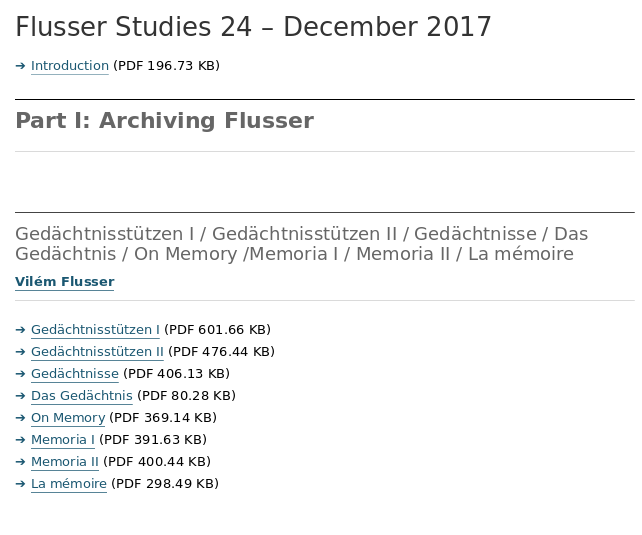Flusser Studies, 24: Archiving Flusser (2017) [DE, EN]
Filed under journal | Tags: · archive, media, theory

“Archiving the work of an artist or thinker is an activity that strongly defines and structures our view of her/him. Archives allot a specific place for each selected item and at the same time construct possible paths between them. This implies highlighting some areas while hiding others. In this sense, an archive is always also a metaphor for the work of an author. Traditional archives operate with hierarchical structures like the alphabet, which automatically define s a beginning and an end. Information technology, however, has opened a completely new array of possibilities. This issue of Flusser Studies reflects upon these theoretical and epistemological implications by presenting the different ways that Vilém Flusser’s work has been archived over the last 25 years.” (from Introduction)
With contributions by Vilém Flusser on memory, Bernd Wingert on Flusser Hypertext, Vera Schwamborn on MaHiPo, Klaus Sander and Daniel Irrgang on Flusser-Quellen, Claudia Klinger on Die Flusser-Files, Anita Jóri and Alexander Schindler on the Vilém Flusser Archive, Gerardo Santana Trujillo on MagmaMater, Gustavo Bernardo Krause on FlusserBrasil, and Simone Osthoff on her research on the archive.
Edited by Steffi Winkler and Rainer Guldin
Published December 2017
ISSN 1661-5719
Glass Bead, 2: Site 1: Logic Gate, the Politics of the Artifactual Mind (2017) [English/French]
Filed under journal | Tags: · abstraction, artificial intelligence, inhuman, logic, machine, mind, theory

“The first issue of the journal was dedicated to repositioning art in the landscape of reason. This issue is focused on the fabric of reason itself, and the ways in which it is currently altered by the emergence of artificial intelligence.
While the capacities of thought are being externalized in machines that increasingly mirror human intelligence, the question of the technical artifactuality of mind and its political ramifications becomes particularly pressing.
For us, far from being limited to the computational instantiation of intelligence, understanding the politics of these developments in artificial intelligence requires acknowledging that mind has always been artifactual.
Site 1: Logic Gate, the Politics of the Artifactual Mind proposes to explore the formal, philosophical and scientific dimensions of this question, so as to consider the role art might play in the lucid unfolding of its possibilities.”
With contributions by Danielle Macbeth, Gary Tomlinson, Matt Hare, Ben Woodard, Nina Power, Matteo Pasquinelli, Benjamin Bratton, Nora Khan, Hito Steyerl, Ian Cheng, Catarina Dutilh Novaes, Reviel Netz, Peli Grietzer, Lee Gamble, Dhanveer Singh Brar, T’ai Smith, and James Trafford.
Edited by Fabien Giraud, Jeremy Lecomte, Vincent Normand, Ida Soulard, and Inigo Wilkins
Publisher Glass Bead, November 2017
HTML, PDFs (English)
HTML, PDFs (French)
See also Issue 1
Amodern, 7: Ephemera and Ephemerality (2017)
Filed under journal | Tags: · archive, ephemera, ink, media, paper, social media, text, theatre

“Like some winged insects, ephemera – the plural of the Greek ephemeron – denotes things that last through the day. Maurice Rickards defined it as “the minor transient documents of everyday life” – bus tickets, business cards, bookmarks. Ephemera describes modern mass media forms such as the newspaper and radio broadcasts, as well as contemporary ones such as email and short message service. Ephemera haunts classical aesthetics, whose pretensions to cultural value and endurance can figuratively efface its own materiality and fragility. Ephemera similarly menaces concepts and practices of history, even when it serves as evidence of the past and the stuff of the archive. Indeed, ephemera problematizes memory itself: Wendy Hui Kyong Chun has theorized that digital media create an “enduring ephemeral” of constantly refreshing, regenerating information, introducing as much instability into computer programs as abides in putatively more fallible, degenerative human memory. With this observation, the paradox of ephemera – that it was meant to be disposable and fleeting, but is instead often kept and collected – comes into view as a central ambivalence of modern mediated life.”
With essays by Christina Svendsen, Mollie McFee, Priti Joshi, Kimberly Hall, Dennis Yi Tenen, Susan Zieger, Lindsay Brandon Hunter, and a conversation with Mita Mahato.
Edited by Priti Joshi and Susan Zieger
Publisher Concordia University and Lakehead University, December 2017
Creative Commons Attribution 3.0 Unported License

